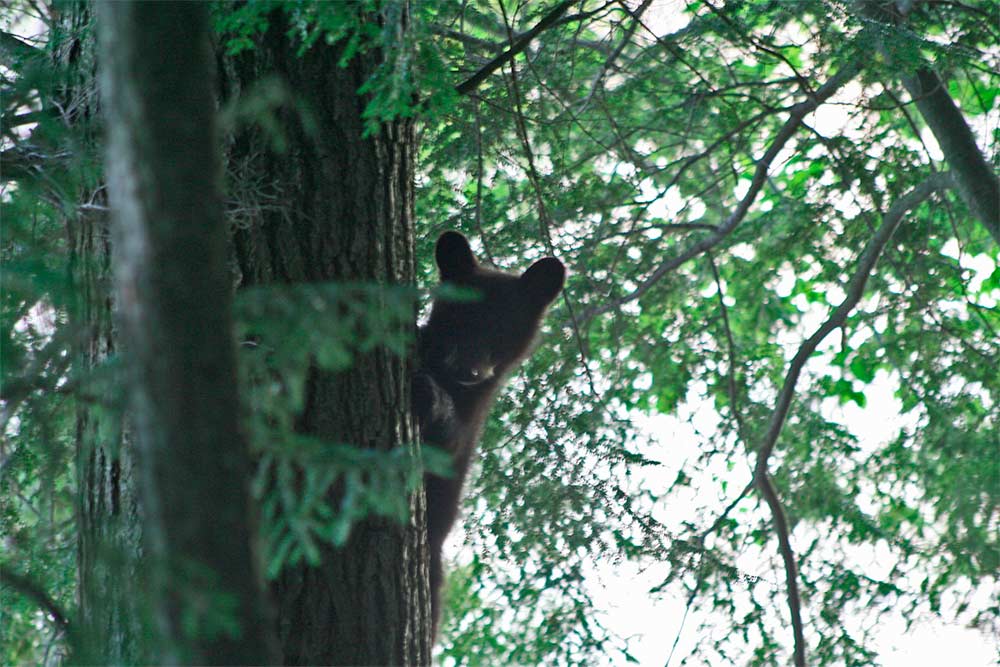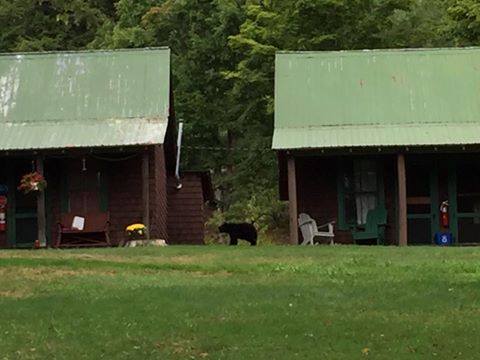Newsletter Detail
 It has been a year of noticeable human and black bear interaction. The number of visible bear with offspring in Raquette Lake and surrounding areas was high this past season. We have seen bears on Long Point and at Antlers. The cub picture was taken by Chris Bode at Camp Marion. A mother entered a window at St. William’s on Long Point’s main house and was found eating in the kitchen before being shooed away. She later returned with her three cubs. During our adult education class at Antlers, a small bear was seen sniffing its way across the cottage porches.
It has been a year of noticeable human and black bear interaction. The number of visible bear with offspring in Raquette Lake and surrounding areas was high this past season. We have seen bears on Long Point and at Antlers. The cub picture was taken by Chris Bode at Camp Marion. A mother entered a window at St. William’s on Long Point’s main house and was found eating in the kitchen before being shooed away. She later returned with her three cubs. During our adult education class at Antlers, a small bear was seen sniffing its way across the cottage porches.
The current black bear population across New York in areas open to hunting is estimated to be 6,000-8,000 according to the DEC website. About 50-60 percent of that population inhabits the Adirondacks. Despite the DEC’s educational campaign “A fed bear, is a dead bear,” behaviors have not changed. Some of the behaviors are intentional due to wanting to see a bear while other behaviors are due to lack of education or unwillingness to change human patterns. The Sept. 27 issue of the Adirondack Express stated that ‘…nine bears have died this summer because humans refuse to alter their behavior.”
For an animal that naturally eats mostly grasses, fruit, nuts, seeds, insects and the like, bears are large animals. Male blacks bear average 300 pounds and females around 170. Bears accustomed to eating trash and birdseed are often larger. Their curiosity and intellect especially where food is involved creates an interesting dynamic. Once a bear learns where to get human food, they often return becoming bold and aggressive. They may also be stressed and unhealthy by eating other items in our trash like soaps, packaging materials and insect repellants.
Home owners in bear country can help mitigate bear problems by removing bird feeders after April 1, keeping trash in sealed sturdy containers inside structures, burning grease off of grills after use and t he like. Tips for campers include storing food in bear bags, canisters or vehicles, not leaving food unattended, treating smelly toiletries and trash as food items for storage, burning only natural materials, and being sure to cook, eat and cleanup before sunset when bears are active. It is illegal to feed bears in New York.
he like. Tips for campers include storing food in bear bags, canisters or vehicles, not leaving food unattended, treating smelly toiletries and trash as food items for storage, burning only natural materials, and being sure to cook, eat and cleanup before sunset when bears are active. It is illegal to feed bears in New York.
Review and get to know the laws and regulations of where you plan to camp or visit. Additional information including teaching materials can be found on the DEC website. Leave No Trace trainings are also recommended for campers.
Photo credit Barbara Schooley '72

